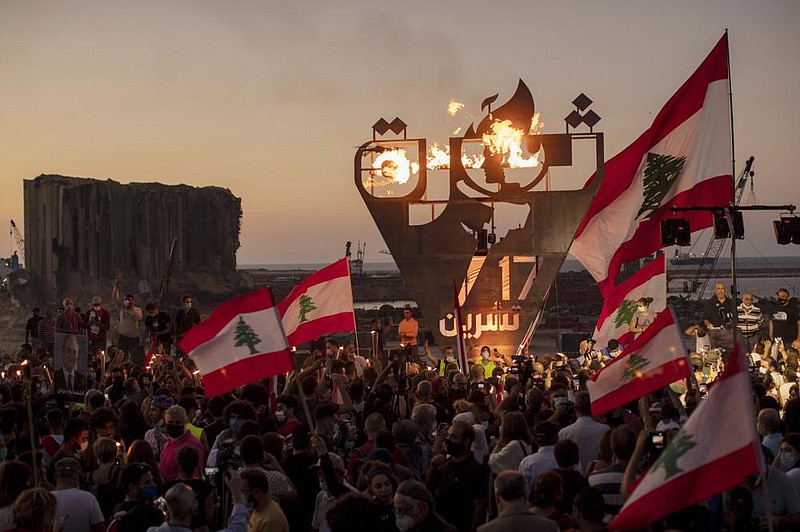BEIRUT -- Thousands of people on Saturday marked the first anniversary of a protest movement in different parts of Lebanon, including its three largest cities, Beirut, Tripoli and Sidon. But the protesters were far fewer than those last year.
A year ago, hundreds of thousands of Lebanese took to the streets protesting taxes and a rapidly deteriorating economic crisis. A spontaneous and hopeful nationwide movement was born, denouncing an entire political establishment that had for decades pushed Lebanon toward collapse.
Today, as crises multiply and the country dives deeper into uncertainty and poverty, protests seem to have petered out. Even widespread anger over a devastating explosion at Beirut's port on Aug. 4, blamed on government negligence, failed to reignite the movement.
Some argue the protests lost momentum because of the political elite's moves to hijack and weaken the movement. Protesters have been met with violence, arrest and intimidation. Others say Lebanese have become numb to incompetence and corruption among the political class.
But Lebanon's confessional-based power-sharing system also proved difficult to bring down. A revolt against the status quo means breaking a sectarian patronage network cultivated by the ruling elite that many in the divided population benefit from. Even if dissatisfied, some blame other factions for the country's problems or fear change will give another sect power over them -- a fear politicians eagerly stoke.
[Video not showing up above? Click here to view » https://www.youtube.com/watch?v=oDzYQbBf4Pk]
"We don't have one head of state, it's a group of men, they have agreed to divide the spoils of the state at every level. It's a system that you can hardly topple," said Carmen Geha, associate professor in public administration and an activist. She compared the dismantling of Lebanon's system to the dismantling of Apartheid in South Africa, a long and arduous process.
For all its limitations, the protest movement that emerged on Oct. 17, 2019, had successes.
Even after street demonstrations dissipated, grassroots networks quickly mobilized following the Beirut explosion, which killed nearly 200 people and wrecked tens of thousands of homes. Authorities almost completely left the public on its own to deal with the aftermath, with no government cleanup crews in the streets and little outreach to those whose homes or businesses were wrecked.
So activists stepped in and took charge of rebuilding.
"You find people more mobilized toward helping each other ... that is another face of the revolution," Geha said. "We need to show people how inept politicians are and provide them with an alternative system, one focused on services."
Two governments were toppled under the pressure of the streets -- one last October, the other right after the Beirut explosion.
Jad Chaaban, an economist and activist, says the protest movement was thwarted by the political elite.
"The politicians cemented their alliances again and distributed the roles to protect each other," he said. "The counter-revolution was at the level of the economy, allowing it to deteriorate ... [and] on the streets through a fierce police crackdown."
The political factions in power have generally claimed to support the protesters' goals of change and an end to corruption. At the same time, they have made no move to enact change, often depicting the protesters as agents of instability.
The protest movement also failed to offer solid leadership. From the start, protesters shunned calls to do so, worried leaders could be targeted or co-opted. With time, that absence became a constraint.
Some experts see the protesters' chief demand as unrealistic -- typified in the chant, "All of them means all of them," meaning all politicians in the establishment must step down.
That addressed the wrong issue and was "a dilution of the problem," said Nadim Shehadi, from the London-based think tank Chatham House.
"The problem in Lebanon is not the system of governance, it has its flaws but it is not the cause of the problem, Hezbollah is," said Shehadi, who is also executive director of the New York headquarters and academic center at the Lebanese American University.
At various protests, supporters of the Iranian-backed Hezbollah and its Shiite ally Amal attacked demonstrators.
In Beirut, hundreds marched on Saturday from different parts of the capital and gathered outside the port, the scene of the huge blast. They later lit a giant flame over a metal statue that reads in Arabic the "October 17, Revolution." The flame was lit at 6:07 p.m. to mark the moment the port blast occurred.








